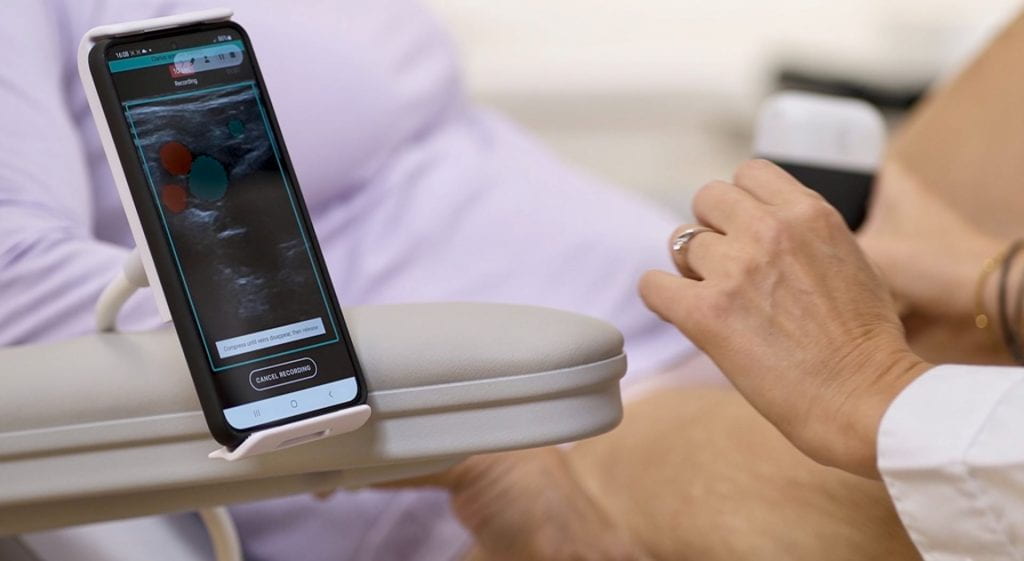
Aim
This project seeks to explore the accuracy and acceptance of artificial intelligence (AI)-guided point-of-care ultrasound (POCUS) to diagnose deep vein thrombosis (DVT) in primary care.
The AI-app, ThinkSono Guidance, supports operators in performing DVT scans of the proximal leg, streamlining the collection of ultrasound images of sufficient quality for remote diagnosis. This approach could empower healthcare providers new to DVT diagnostic ultrasound to conduct point-of-care DVT diagnostics, e.g. at a GP Surgery or a patient’s home.
The project consists of three components:
- Diagnostic test accuracy (DTA), which aims to validate the sensitivity and specificity of the AI-guided scans in 500 individuals suspected of DVT. The AI-guided scans will be performed by Healthcare Assistants (HCAs), followed by a standard scan conducted by sonographers in a primary care DVT clinic.
- Participants will be invited to complete a patient satisfaction survey after receiving both scans, evaluating their satisfaction with the AI-guided diagnostic scan.
- We will conduct semi-structured interviews with a subset of participants and HCAs (25 in total) to delve into the nuances of acceptance of and potential resistance to AI-guided DVT diagnosis.
Why is this research important?
Currently, standard DVT diagnosis is embedded in a complex clinical pathway incorporating a risk assessment tool, laboratory analyses, and ultrasound, the latter typically performed in secondary care. This pathway is known for its resource-intensive nature and time-consuming process, which is particularly challenging for high-risk patients.
Diagnosing DVT using the AI-app could be a game-changer, especially for those who face obstacles in accessing the traditional DVT diagnostic pathway. The implementation of AI-technology in primary care could enhance diagnostic capabilities, reducing the necessity for referrals to secondary care. This could especially benefit our older population who may be frail, housebound or dealing with multiple health conditions.
Moreover, by minimising the need for secondary care referrals, ThinkSono Guidance could potentially contribute to reducing the financial burden on the National Health Service (NHS). This paradigm shift could hold promise for more efficient, cost-effective, and patient-centric healthcare services.
Who can take part
We are recruiting participants from GP Care DVT clinics from 26 February 2024. Every GP Care-eligible patient who has the capacity to consent can take part.
How to take part
GP Care- eligible patients will be invited to participate in the study. Those interested will receive study information in their preferred way — either through a text message or email. However, printed copies will also be available at the clinic.
The qualitative phase of the study incorporates semi-structured interviews to delve into the nuances of acceptance and potential resistance regarding AI-guided DVT diagnosis. This phase engages a subset of participants and 5 HCAs as the operator of AI-guided scan, encompassing about 25 participants.
What will happen during the appointment?
During their appointment at the DVT clinic, patients willing to participate will undergo an additional ultrasound scan with a handheld ultrasound probe, which will take about 5 minutes. Following both scans, AI-guided and standard ultrasound, they will be asked to complete a patient satisfaction survey.
Patients interested in participating in an interview can do so by indicating their preference on the patient satisfaction survey. Following this, they will be contacted within a week after the scan to arrange an interview appointment.
Who to contact for further information:
Kerstin Nothnagel
PGR and PhD student University of Bristol
Centre for Academic Primary Care, Population Health Sciences
Canynge Hall, 39 Whatley Road, Bristol, BS8 2PS
Kerstin.Nothnagel@bristol.ac.uk
0117 455 9936
